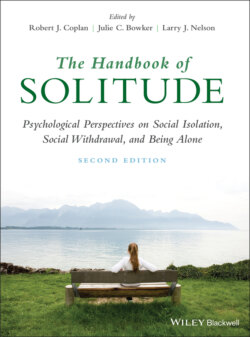Читать книгу The Handbook of Solitude - Группа авторов - Страница 47
Harlow’s studies on maternal deprivation and total isolation.
ОглавлениеHarry Harlow is one of the most prominent scientists who examined the effects of social deprivation and social isolation on nonhuman primates’ behaviors. Harlow strived to answer whether and how the type, duration, and the timing of social isolation had a lasting impact on rhesus monkeys’ behaviors. In his earlier studies, Harlow used the partial isolation paradigm: monkeys were separated from their mothers shortly after birth and kept alone in a wire‐meshed cage (see Harlow & Harlow, 1962). Although monkeys were kept alone in their cages, they were housed in a larger room where they could see and hear other monkeys but could not have direct physical contact with them. Harlow reported that monkeys that experienced partial isolation showed abnormal behaviors including staring blindly into space, engagement in repetitive and compulsive behaviors, and low levels of attention toward the monkeys kept in neighboring.
In subsequent studies, Harlow examined the effects of total isolation by removing monkeys from mothers shortly after birth and placing them into steel chambers that prevented them from seeing or hearing other monkeys or humans (Harlow et al., 1965). Harlow examined groups of monkeys that were kept in isolation for a duration of three months, six months, and one year, with the goal to understand if the duration of isolation had an effect on monkeys’ behaviors and whether it determined the “reversibility” of the early negative experiences. Harlow reported that the duration of social isolation had an additive or cumulative effect on later ability to socialize, such that monkeys isolated for three months showed noticeable disturbances in their social behaviors. However, those isolated for 6 months and 12 months showed increasingly worse social behaviors (Harlow et al., 1965). Harlow and his students also found that rhesus monkeys reared in total isolation for six months developed normal behavioral repertoire if they had opportunities to spend time with more socially skillful peers (Suomi & Harlow, 1972). These latter findings suggested that the maternally deprived monkeys’ behavioral problems were at least partially reversible if they had opportunities to interact with more socially competent peers.
